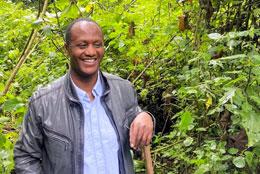From refugee to reverend

By Michael Staples
New Canadian Media
Newcomers looking to join the Canadian Armed Forces face a “tough and challenging” environment, but conditions are getting better as the military struggles against bias, systemic racism and discrimination.
That’s the message from a former African immigrant who went on to become a padre in the Canadian Armed Forces, spending several years at 5th Canadian Division Support Base Gagetown, situated just south of Fredericton.
Charles Deogratias, raised as a refugee in Tanzania after his parents fled Rwanda in 1959, said steps are being taken to fight “bias, systemic racism and discrimination” in the military.
“It’s still so real and so hard for many people to grasp,” Deogratias, a retired major, said in a telephone interview from Kigali, Rwanda. “I experienced this many times.”
Deogratias said a report released last year in which the issues were examined in detail and recommendations made to correct the situation is a good first step.
The Minister of National Defence Advisory Panel on Systemic Racism and Discrimination discovered, among other things, evidence of white supremacists, as well as the participation of “defence team members” in Ideologically Motivated Violent Extremism (IMVD), which includes anti-authority, xenophobic, and gender-driven motivations.
The probe recommended change in 13 areas across the organization, including ensuring reporting procedures and tools are made accessible and are well understood by all members of the Forces.
“It will take time; it cannot happen overnight, but, at least this is a start,” Deogratias, a veteran of Canada’s combat mission in Afghanistan, said. “Now, there is a concerted effort to see that this is eliminated in the (CAF). They are working toward that and there is hope.”
Last year’s findings come as the Forces prepare to welcome more immigrants into its ranks.
The Department of National Defence revealed in May that it had received approximately 11,000 applications to join from permanent residents, people who are not citizens, but are allowed to live, work, and study in Canada on a permanent basis.
The military announced in December that such individuals are welcome to apply.
Deogratias, who has outlined his journey from the jungle to the Canadian Armed Forces in a book called “Born to Die … From a Refugee to a Call to Serve,” said newcomers seeking a career in the military should not be afraid of the environment because they have more room to maneuver than those who came before them.
He said the “old guard,” those who may not be thrilled with immigrants joining the ranks, have no choice but to accept them.
“There is a policy now in the (CAF) that if someone treats you with abuse, abusive language … if it’s reported, they are no longer protected.”
Deogratias, a Presbyterian minister who came to Canada in 1993 after spending time in the U.S., said he did a lot of talking about racism during his nearly 22 years in the Forces.
Despite challenges facing permanent residents intent on joining the Forces, Deogratias said his message never varies.
He tells them change has come to the military and there is a lot to celebrate in terms of what is happening.
“I tell all newcomers now that the (CAF) is the place to be. I tell them everywhere I go.”
Deogratias said the secret to success for minorities is to stay resilient, do what the military throws at them, and take care of themselves and their families.









